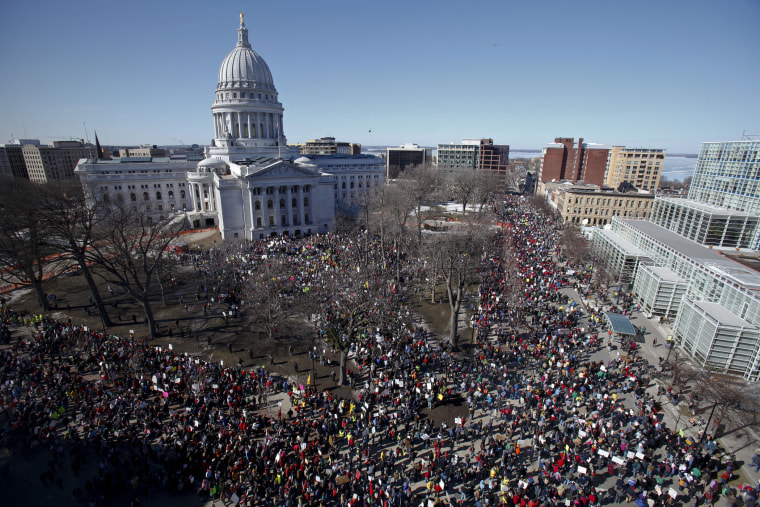This story is a little off the beaten path, but the Wisconsin State Journal this week reported on a measure that's worth keeping an eye on.
State lawmakers have made Wisconsin the 28th state to request an unprecedented national convention to amend the country's founding document, the U.S. Constitution.The state Senate voted 19-14 Tuesday to pass a resolution that completed Wisconsin's application for a convention, which does not require the governor's signature. The state Assembly passed the resolution in June.
According to the Wisconsin resolution, approved by Republicans, the convention is needed "for the limited purpose of requiring the federal government to operate under a balanced budget."
The irony is extraordinary: while Republicans at the state level want a constitutional mandate to eliminate federal budget deficits, Republicans inside the Beltway are pushing a massive tax-cut package that would make the deficit vastly larger, not smaller.
But even if we put that aside, it's worth taking a moment to emphasize just how bad an idea a constitutional convention would be.
This gets a little complicated, so let's revisit a Q&A we first discussed a couple of years ago.
So, what's an Article V convention of the states?
Ordinarily, proponents of constitutional amendments look for two-thirds majorities in the House and Senate. There is, however, an alternative route: Article V of the Constitution says two-thirds of the states can call for a convention to consider amendments, which would then need to be ratified by three-fourths of the states.
So how many states need to support a convention to make this happen?
34.
And how many are on board with the idea?
After this week, 28, including Wisconsin.
Since the Constitution’s creation, how many of these conventions have we seen
None. This would be the first since the original constitutional convention in 1787.
Who thinks this is a good idea?
Occasionally, progressive leaders will push for a convention as a way to circumvent Congress on campaign-finance reform, but most proponents are on the far-right fringe. The religious right movement, in particular, has pushed aggressively for a convention.
How, exactly, would this work in practice?
No one can say with certainty how such a convention would play out since there is no precedent for such an event and the relevant constitutional language adds little clarity. Probably the most significant question is scope: some proponents, such as the Wisconsin Republicans this week, say they want a narrow convention focused solely on the issues they are about, but there’s a real possibility that once the constitutional door is open, convention delegates could consider literally any changes, “even if it included overhauling the entire constitutional system” of the United States.
Harvard Law School Professor Laurence Tribe wrote not long ago that convening a convention would be “putting the whole Constitution up for grabs.”
How would convention delegates be chosen?
No one knows for sure; it’s generally assumed that Congress would have to establish some kind of rules for the process. Many scholars fear, however, that a radicalized Congress would stack the deck, effectively rigging the process to ensure far-right outcomes.
What’s more, there’s no reason to assume a convention would be bound by congressional guidance. The late Supreme Court Chief Justice Warren Burger once wrote, “[T]here is no way to effectively limit or muzzle the actions of a Constitutional Convention. The Convention could make its own rules and set its own agenda. Congress might try to limit the convention to one amendment or one issue, but there is no way to assure that the Convention would obey.”
Is this the only way to get a balanced-budget amendment added to the Constitution?
Perhaps, but a balanced-budget amendment is the worst idea in the history of bad ideas.
